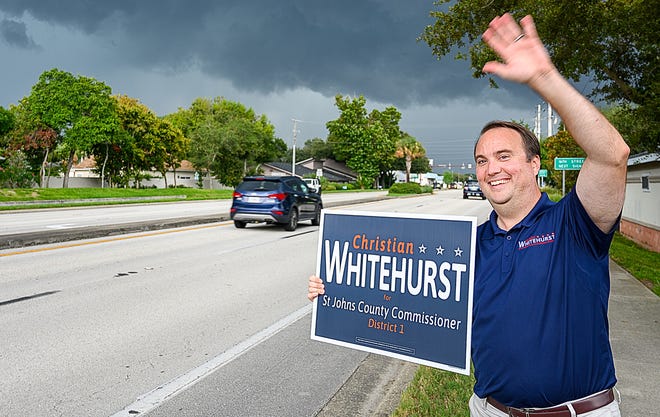Controversial St. Johns County Commission Chairman CHRiSTIAN WHITEHURST is under investigation by HUD for Fair Housing And Title VI violations in his disdainful refusal to support a Public Housing Agency, expressly stating he did not want "the kind of people" who receive HUD Section 8 Housing Vouchers living in his County. Some 65% of "them" are African-American or Hispanic.
In the months since I filed my HUD Title VI Rights Act complaint, and since the Governor signed the Live Local Act, at several Commission meetings including this morning, August 15, 2023, CHRISTIAN WHITEHURST has asked that property owners and developers seeking zoning approval waive their right to use the property for affordable housing under the Live Local Act.
What was the purpose of that request?
I question his question.
Commissioner KRISTA KEATING-JOSEPH chimed in on item 8 this morning commended WHITEHURST for his creativity. She also voted against the Public Housing Agency.
Do Commissioners WHITEHURST and JOSEPH's statements at the August 15, 2023 meeting reflect the absence of mistake or accident, common scheme or plan, of the County's hostility to a PHA in 3-2 vote?
Is that ethical?
There was no testimony on this issue. No public benefit expressed in the hearing.
Does County Commission wish to enact a policy, procedure, or rule, or just mount sneak attacks on the Live Local Act?
Discrimination is wrong.
CHRISTIAN WHITEHURST is overbearing.
Ungracious, unctuous, uncouth, uneducated and other-directed.
Is it time for him to go?
As George Burns would say, "say goodnight, Gracie!
From DeSANTIS' former law firm, Holland & Knight, which pro bono, successfully represented eighteen of us against the City of St. Augustine on Sunshine and Open Records violations on the attempt to outsource the 450th to a dodgy non-profit, the First America Foundation:
Highlights
- Florida Gov. Ron DeSantis signed into law Senate Bill 102, the Live Local Act (the Act), on March 28, 2023, with an effective date of July 1, 2023.
- The Act mandates that a local government authorize the development of multifamily rentals on sites that are zoned as mixed-use residential, commercial or industrial if at least 40 percent of the residential units in a proposed multifamily development will, for a period of at least 30 years, be affordable to individuals making up to 120 percent of the local area median income (AMI).
- In addition, a county or municipality must apply the highest "allowed" density on any land within its jurisdiction to the proposed multifamily development, while the maximum height is determined based on the highest currently allowed height for commercial and residential development located within 1 mile of the proposed development. At a minimum, the Act mandates that a local jurisdiction allow the proposed development to build to a height of three stories.
- The Act provides that certain developments will be eligible for a 75 percent or 100 percent ad valorem tax exemption, depending on the level of rent restriction for the units, which will first apply to the 2024 tax roll and require a certification notice issued by the Florida Housing Finance Corporation (FHFC).
Florida Gov. Ron DeSantis signed into law Senate Bill 102 on March 28, 2023, with an effective date of July 1, 2023. Commonly referred to as the Live Local Act (the Act), it has significant land use, zoning and tax benefits that will now be available to developers and investors. This Holland & Knight alert provides a general outline of the Act's impact on land use and zoning, as well as a general summary of the Act's benefits from a tax perspective.
Land Use and Zoning Benefits
The Act mandates that a local government authorize the development of multifamily rentals on sites that are zoned as mixed-use residential,1 commercial or industrial if at least 40 percent of the residential units in a proposed multifamily development will, for a period of at least 30 years, be affordable to individuals making up to 120 percent of the local area median income (AMI), referred to as the Threshold Requirement.
The Act provides that a county or municipality cannot require a proposed multifamily development that will comply with the Threshold Requirement to obtain a land use, zoning, special exception, conditional use approval, variance or comprehensive plan amendment with respect to building height, zoning and density.
Once a multifamily project complies with the Threshold Requirement, a county or municipality must apply the highest "allowed" density on any land within its jurisdiction to the proposed multifamily development. Furthermore, once a project complies with the Threshold Requirement, the local jurisdiction cannot restrict the height of the proposed development below the highest currently allowed height for a commercial or residential development located in the local jurisdiction within 1 mile of the proposed development. At a minimum, the Act mandates that a local jurisdiction allow the proposed development to build to a height of three stories.
There are a panoply of issues associated with the ability to utilize the Act. For example, there are various jurisdictions in South Florida that do not provide for a density per acre but provide for a "pool" of units that can apply to properties. Naturally, one of the questions that arises is regarding the "maximum" density in such jurisdictions. Notwithstanding such issues, the Act provides a path that certainly is tailored toward increasing the inventory of affordable and workforce housing in Florida.
Tax Benefits
The Act provides that certain developments will be eligible for a 75 percent or 100 percent ad valorem tax exemption, depending on the level of rent restriction for the units. If at least 71 units are affordable to natural persons earning up to 80 percent of the AMI,2 then each unit provided to such persons qualifies for a 100 percent ad valorem tax exemption. If at least 71 units are affordable to natural persons earning more than 80 percent of the AMI and up to 120 percent of the AMI, then each unit provided to such persons is eligible for a 75 percent ad valorem tax exemption. These exemptions first apply to the 2024 tax roll and require a certification notice issued by the Florida Housing Finance Corporation (FHFC).
New Tax Exemptions
This exemption applies throughout Florida without further action by local governments.
The Act defines eligible property to include units in a "newly constructed" multifamily project containing more than 70 units dedicated to housing natural persons or families below certain income thresholds. Newly constructed is defined as an improvement substantially completed within five years before the property owner's first application for the exemption. The units must be occupied by such persons or families and rent limited so as to provide affordable housing at either the 80 percent to 120 percent AMI threshold. Rent for such units also may not exceed 90 percent of the fair market value rent as determined by a rental market study. If an occupied unit qualifies for this exemption and the following year it is vacant on Jan. 1, the vacant unit is eligible for the exemption provided it meets the other requirements and a reasonable effort is made to lease the unit to eligible persons or families.
Units subject to a recorded agreement with the FHFC under Ch. 420, F.S., to provide affordable housing and property receiving an exemption under Section 196.1979, F.S., as created by a local affordable housing exemption ordinance, are not eligible to receive this exemption.
Procedure
The exemption first applies to the 2024 tax roll and will be repealed on Dec. 31, 2059.
To receive this exemption, a property owner must 1) file a certification form with the FHFC and 2) submit an application by March 1 to the local property appraiser, accompanied by the certification notice from the FHFC.
As part of the FHFC certification process, a property owner must submit a request on a form that includes:
- the most recent market study (the study must have been conducted by an independent certified general appraiser in the preceding three years)
- a list of units for which the exemption is sought
- the rent amount received for each unit
- a sworn statement restricting the property for a period of no less than three years to provide affordable housing
The certification process is administered within the FHFC. The agency's responsibilities include publishing the deadline for submission, reviewing each request, sending certification notices to both the successful property owner and appropriate property appraiser, and notifying unsuccessful property owners with reasons for any denial.
Penalty
If the property appraiser determines that an exemption has been improperly granted within the last 10 years, the property appraiser must serve the owner with a notice of intent to record a tax lien. Such property will be subject to the taxes improperly exempted, plus a penalty of 50 percent and 15 percent annual interest. Penalty and interest amounts do not apply to exemptions erroneously granted due to clerical mistake or omission by the property appraiser.
For Further Assistance
If you have any questions or would like assistance regarding the recent Act requirements, please contact one of the authors.
Mischaël Cetoute, a former law clerk in the firm's Miami office, contributed to this alert.
Notes
1 The zoning districts that comprise mixed-use districts are anticipated to be an issue in certain municipalities. For example, are Planned Area Developments or Planned Developments mixed-use districts?
2 In Miami-Dade, the area median income is $68,300. The upper income threshold for all of the programs (120 percent AMI) is $81,960. Miami-Dade County's Workforce Housing Development Program includes families whose incomes are within 60 percent to 140 percent AMI. Therefore, while units restricted from 120 percent to 140 percent AMI qualify in the county, the aforementioned units do not count toward the minimum of 70 units required by the Live Local Act.
Information contained in this alert is for the general education and knowledge of our readers. It is not designed to be, and should not be used as, the sole source of information when analyzing and resolving a legal problem, and it should not be substituted for legal advice, which relies on a specific factual analysis. Moreover, the laws of each jurisdiction are different and are constantly changing. This information is not intended to create, and receipt of it does not constitute, an attorney-client relationship. If you have specific questions regarding a particular fact situation, we urge you to consult the authors of this publication, your Holland & Knight representative or other competent legal counsel.



Honestly thanks to their politics and style of government there are no good paying jobs here that employ people for living wages, only small business owners with a small entourage of slaves. These types only do they want here along with certain refugees and retirees. They've got nice houses and generational wealth so what do they care about housing for people with already limited economic mobility on top of the already limited opportunity and economic mobility we see here in St. John's County. If you don't have money go away!
ReplyDeleteDon't know what these people are talking about "change the character of the county".. because about 20% are about an inch away from bone crushing, pound me in the ass poverty. Anything they can do for people is good. Character my ass, look at all the whackos, whackoffs, and smackoffs with Trump bumper stickers and they barely have a pot to piss in. Look at all the animal levels of intelligence and tell me what sort of character does this produce or has been produced. Tell me what the SJC GOP has done to produce good character or set an example.
ReplyDelete